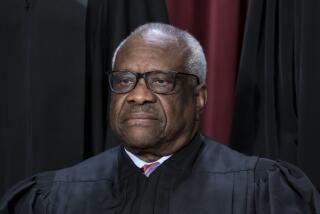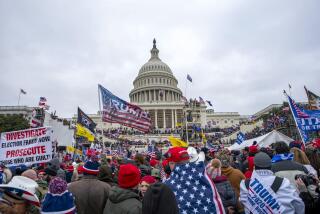Sierra Club Asks Scalia to Step Aside in Cheney Case
- Share via
WASHINGTON — Lawyers for the Sierra Club on Monday formally requested that Justice Antonin Scalia step aside from ruling in the forthcoming case involving Vice President Dick Cheney and his energy task force, saying the two men’s recent duck-hunting trip had created the appearance that the justice was likely to favor the vice president in the dispute.
A recusal by Scalia was “necessary to redress an appearance of impropriety and to restore public confidence in the integrity of our nation’s highest court,” said David Bookbinder, the Sierra’s Club legal director in Washington.
The motion to recuse was sent to the full court, not to Scalia alone. “Obviously, this is an issue for each of the nine justices to consider, since the integrity of the entire court is being called into question,” Bookbinder said.
It is rare for lawyers to formally urge a justice to step aside because, by law and tradition, Supreme Court justices decide for themselves whether they have a conflict of interest. Many lawyers think such a request may backfire on the litigants.
It is even more rare for a legal motion to include editorial cartoons and jokes from late-night comedians that poke fun at a member of the high court.
The motion filed Monday evening included five cartoons. One portrays a large duck labeled “Conflict of Interest,” alongside of which crouch two hunters. The hunter labeled “Scalia” calls out: “Duck? Do you see a duck, Dick?” “Duck? What duck?” asks the one labeled “Cheney.”
In one of his monologues, Jay Leno on “The Tonight Show” described an “embarrassing moment” for Cheney when he visited the White House. “Security made him empty his pockets and out fell Justice Antonin Scalia!” the comedian said.
Leno also noted that the two officials were still pondering whether they had a conflict of interest. They would decide “as soon as Halliburton finishes construction on Justice Scalia’s new house,” Leno joked, referring to Cheney’s years as head of the energy services giant.
In mid-December, the high court voted to take up Cheney’s appeal that seeks to reverse a judge’s order requiring the vice president to turn over documents detailing who participated in a task force, chaired by Cheney, that set the administration’s energy policy.
This seemingly minor dispute has grown over the last three years as Cheney has insisted on secrecy, contending that any administration needs a guarantee of “uninhibited” advice from experts.
The Sierra Club and Judicial Watch, two public interest groups, sued Cheney, contending he had violated an open-government law by meeting behind closed doors with corporate lobbyists. They won preliminary victories in lower courts.
Three weeks after the high court agreed to hear the vice president’s appeal, Scalia and Cheney flew to southern Louisiana in a small military jet that served as Air Force Two.
Since the duck-hunting trip was first reported by the Los Angeles Times in mid-January, editorials in 20 of the nation’s 30 largest newspapers have urged Scalia to withdraw from the case, according to the Sierra Club’s motion.
The hunting trip has exposed sharply varying views over what constitutes impartiality for a Supreme Court justice.
In 1974, Congress tightened the law that governs all federal judges. It says, “Any justice, judge or magistrate of the United States shall disqualify himself in any proceeding in which his impartiality might reasonably be questioned.” But the meaning of that provision depends on the interpretation given it by judges -- and, ultimately, by the Supreme Court.
Scalia maintained that social contacts between justices and high government officials were routine in Washington and did not require a judge to step aside when those officials had cases in “their official capacity” before the court.
Cheney was being sued as the vice president, not in his personal capacity.
“I do not think my impartiality could be reasonably questioned,” Scalia said.
Disagreeing, the Sierra Club lawyers said reasonable persons would see “an appearance of favoritism” when a jurist vacations with the target of a lawsuit.
The motion also relies on a quote from a high court opinion written by Scalia.
“What matters is not the reality of bias or prejudice but its appearance,” he wrote in 1994.
By that standard, “Justice Scalia should be recused from this matter,” the Sierra Club said.
More to Read
Get the L.A. Times Politics newsletter
Deeply reported insights into legislation, politics and policy from Sacramento, Washington and beyond. In your inbox twice per week.
You may occasionally receive promotional content from the Los Angeles Times.











